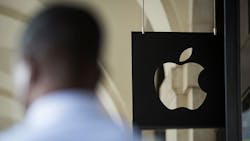Apple iPhone Suppliers Are Said to Mull Move If Tariffs Hit 25%
Apple Inc.’s suppliers will consider shifting iPhone production away from China should tariffs on U.S. imports skyrocket, but the U.S. company plans to sit tight for now, people familiar with the company’s thinking said.
The tech giant’s suppliers intend to stick with the existing model even if the U.S. levies a 10% import tariff on smartphones, the people said, asking not to be identified talking about a private matter. But it will have to reassess the situation should U.S. President Donald Trump decide on a more punitive 25%, the people said.
iPhones -- the majority of which are made by assembly partner Hon Hai Precision Industry Co. in China and shipped around the world -- have so far been spared in a tit-for-tat trade war between the world’s two largest economies. But Trump told the Wall Street Journal last month that tariffs could be slapped on smartphones and laptops made in China, the world’s largest manufacturer of electronics.
Apple has long used the world’s No. 2 economy as its production base for everything from its signature device to iPads and Macs. The company’s supply chain now spans hundreds of companies, culminating in assemblers such as Hon Hai and Pegatron Corp. Apple wasn’t available for comment outside of U.S. business hours. Hon Hai and Pegatron declined to comment.
Apple’s manufacturing partners are largely beholden to the U.S. company’s wishes. Migrating parts of the sprawling network they underpin will be difficult and the U.S. company seems to be in wait-and-see mode for now, one of the people said. An Apple partner has already suggested alternative locations for non-iPhone production, but the U.S. company has indicated there’s little need to make such a move for now, another person said.
That may change if tariffs escalate, an outcome now in the balance as Washington and Beijing begin thorny negotiations on a trade deal that could scale back a series of tariffs implemented this year. Apple, already grappling with mounting evidence that its latest iPhone line-up has failed to excite consumers, can ill-afford a sharp hike in import taxes.
A 10% tariff could result in an earnings-per-share decline of just $1 for Apple, should all its hardware sold in the U.S. be subject to the levy and the company absorbs the cost, RBC analyst Amit Daryanani wrote in a Nov. 28 research note. That compares with the average 2019 Apple-EPS estimate of $13.32, according to data compiled by Bloomberg.
However, a more severe scenario of a 25% tariff -- absorbed by Apple -- could result in an EPS decline of about $2.50, he added.
In his early years running Apple, Tim Cook would respond to questions about increasing manufacturing in the U.S. by saying the skill sets in China are more conducive to producing the company’s products. However, in recent months, he has modified that view, saying in an interview this year that “it’s not true that the iPhone is not made in the United States.” Some components, like the smartphone’s glass cover, are manufactured in the U.S. and shipped for assembly in China.
By Debby Wu
About the Author
Bloomberg
Licensed content from Bloomberg, copyright 2016.
